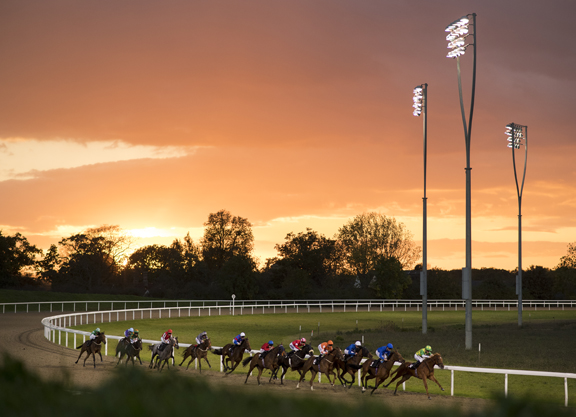By Emma Berry
In what was described as a “precautionary measure”, the British Horseracing Authority (BHA) suspended all racing in the country on Thursday following confirmation of three cases of Equine Influenza (EI) in racehorses in the Cheshire stable of Donald McCain.
McCain was represented by a runner at each of the jump meetings at Ludlow and Ayr on Wednesday. By early Wednesday evening, it had been confirmed by the Animal Health Trust (AHT) that three vaccinated horses in one racing yard had tested positive for EI. Confirmed cases among the British racehorse population must be reported to the BHA.
Robin Mounsey, Head of Media for the BHA, told the TDN on Thursday morning, “Coughing and nasal discharge are commonly seen symptoms in equines and we don't stop movement of horses in this situation until there is a confirmed case of Equine Influenza.”
Once the presence of the disease had been identified on racing premises, the BHA issued a statement at 11:30pm on Wednesday to warn of an initial one-day shutdown for racing across Britain. The bulletin included confirmation that horses from the affected yard had raced at Ayr and Ludlow.
“This is a standard contingency in the event of an infectious disease affecting our horses,” read a follow-up statement on Thursday. “It was essential that racing be stood down today and controls on movements of horses be put in place in order to attempt to control the spread of the disease, and the decision was taken swiftly last night that this course of action should be taken, once the extent of the issue was known. The BHA consulted with its veterinary committee before making this decision.
“We will endeavour to issue regular information but we are still in the early stages of assessing the scale and severity of the outbreak. We are working quickly to identify the extent of the infection and will have more information when further test results are returned today. The results from those tests will not be known until this evening. Following these results being known a call will be convened to discuss the implications and a decision will then be made as to the impact on racing in the coming days.
“We are aware that people want to know the situation as regards racing tomorrow and this weekend and we will seek to provide more clarity as soon as we are able. It is likely that any definitive decisions on whether racing can take place tomorrow will be taken later this evening.”
While racing was suspended in Britain on Thursday, it continued at Thurles in Ireland. Gordon Elliott, whose stable is based in County Meath, had sent five horses to race at Ayr in Scotland on Wednesday but, advised of the situation while his horses were still in transit on the way home, he was able to send the Ayr runners to an isolation yard 15 miles away from his main stable.
The Irish Horseracing Regulatory Board confirmed on Thursday that racing will continue in Ireland but that British-trained horses cannot be entered for Irish races until further notice “as an interim precaution”.
In the meantime, all trainers who had a runner at either Ludlow or Ayr on Wednesday, or at Wolverhampton on Monday, at which McCain was also represented, have been notified by the BHA that they will be unable to send out runners until all horses in the respective yards have been tested and cleared for EI.
Fergal O'Brien, who saddled three horses at Ludlow on Wednesday, is taking extra precautions at his stables in Naunton, Gloucesterhsire. He said, “I normally don't take the horses' temperatures unless I am worried about one of them but at the moment we are taking temperatures morning and night and will do so for the next week. All our horses will be required to have nasal swabs tomorrow so that we comply with the BHA rules. I share the gallops with Nigel Twiston-Davies and we have been advised to keep our horses 100 metres apart for now, or to use the gallops at different times.”
He continued, “I have emailed the BHA to suggest that we don't have any racing for the next three or four days to give themselves some breathing space. It would be no different to losing racing through a hard frost and it's really important that we get a handle on this so we know exactly what we are dealing with.”
Following a number of outbreaks in northern Europe since early December, the BHA had previously issued an equine influenza alert to trainers on Jan. 25. It warned to isolate new arrivals in a yard for 14 days and to investigate with a vet any spread of nasal discharge or dry coughing. It was also advised that horses which had not been vaccinated within the last six months should receive a booster vaccination.
Prior to the three cases confirmed on Wednesday, Feb. 6, there had been 19 incidents of EI across northern Europe in Thoroughbreds and non-Thoroughbreds since early December—ten in France, four in the UK, three in Germany, two in Ireland and two in Belgium. Eleven of these occurred in vaccinated horses. All British racehorses are vaccinated against equine influenza, but it is believed that a different strain of the virus in the recent cases has been affecting vaccinated horses. EI vaccinations are not compulsory for the wider horse population of the UK.
With the covering season set to start from the end of next week, the breeding industry will naturally be hoping that a more widespread outbreak can be averted. Tweenhills Farm & Stud, which stands Roaring Lion, Zoustar (Aus), Charming Spirit (Ire), Havana Gold (Ire) and Lightning Spear (GB), issued the following bulletin to mare owners on Thursday morning: “On veterinary advice we are now insisting that all mares visiting Tweenhills have received an Equine Influenza booster vaccine within six months of proposed arrival at the stud. This includes walk-in mares as well as those boarding at the farm and passports will be checked before mares are allowed to disembark.”
In 2007, the Australian racing industry suffered major disruption through the lockdown of thousands of equine properties, including a two-month quarantine of Randwick racecourse, following a major EI outbreak which was traced to four Japanese stallions at a quarantine station in New South Wales. Racing and all horse movement was cancelled nationwide for three days.
TDN will continue to update this story as the situation develops.
Not a subscriber? Click here to sign up for the daily PDF or alerts.






